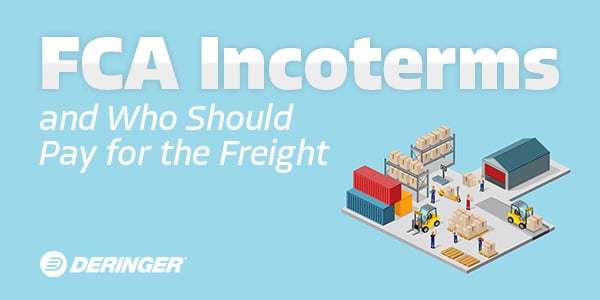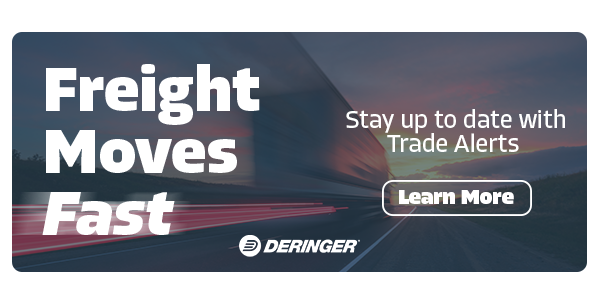
When shipping goods, you must play by the rules. Failing to do so may lead to delays, costly fees, and penalties.
But as global trade increases in volume, the rules of the game have become more complex, increasing the possibility of using the wrong Incoterms® for shipments.
Incoterms® are a set of 11 internationally recognized rules that define the responsibilities of sellers and buyers. These rules specify which party pays for what and who manages the shipment, insurance, documentation, Customs clearance, and other logistical activities.
The International Chamber of Commerce developed Incoterms® to avoid costly domestic and global trade disputes. But disputes can still arise when shippers select the incorrect Incoterms® for their cargo.
Shippers can keep it simple when choosing Incoterms® for international shipping. Free Carrier (FCA) has become the preferred term for international shipping. It breaks down the duties of the seller and the buyer into two categories:
- Shipping from the factory to a Named Location, and
- Exporting from the Country of Origin to the final destination
What does FCA mean?
FCA means free carrier. With international trade, FCA works best.
Under this term, the seller arranges most or all shipping details within the export country while the buyer arranges the remaining transport details to the cargo’s final destination.
With FCA, the seller agrees to deliver cargo to an agreed-upon location, known as the Named Place. Typically, this location is the seller’s premises, a nearby port, or a third-party destination, such as a warehouse.
FCA works well with any form of transport—air, sea, road, and rail—while providing buyers the flexibility to arrange carriage. But, with FCA, the buyer assumes all responsibility and risk for their cargo once cargo arrives at the point of export.
Pros
- Gives buyers more control over their shipments
- Buyers can choose their transport modes
- Uses seller’s knowledge of export requirements in their country
- Cost-effective in delivering goods to specified locations
- Seller payments happen immediately, not after cargo reaches its final destination
Cons
- Buyer bears terminal and loading costs at Port of Origin
- Must rely on the seller to clear disputes in Port of Origin
- Risk passes to the buyer after Customs clears cargo for shipment
Who handles shipping costs with FCA agreements?
The question of who assumes which costs can arise with FCA. Shippers must understand their responsibilities before entering a freight shipping contract.
With FCA, the seller packages goods at their premises then delivers them to an agreed-upon location. The seller then delivers the container to a port, freight station, or the seller’s premises. The buyer assumes risk for the goods at the Named Place and carries risk throughout the transport and delivery journey, meaning the buyer pays all freight costs.
So, if the seller is in Shanghai and sells goods to a buyer in Miami, the Shanghai company leaves the goods at the Port of Shanghai. Here, risk transfers to the buyer when goods leave the dock in the Country of Origin. The seller then bears all freight costs until the goods arrive at their final destination.
The obligations for the seller under FCA break down as follows:
Export Packaging: The seller must pack cargo for export.
Loading Charges: Seller assumes any costs to load cargo for transport at the Named Place.
Delivery to Named Location: Seller assumes any costs incurred transporting goods to the Named Place.
Export Duty, Taxes, and Customs Clearance: Seller takes responsibility for and pays costs associated with shipping from Country of Origin, including Customs examinations, pre-shipment inspections, and Customs documentation.
Under these terms, the seller cannot request compensation for completing the above tasks. All quotes from sellers should include these costs.
However, once cargo ships, all responsibility and risk transfer to the buyer. The responsibilities of the buyer under FCA include:
Origin Terminal Charges: Costs associated with the shipping terminal as cargo gets loaded on a designated vessel.
Loading on Carriage: Loading charge required by the shipping line.
Carriage Charges: Once loaded, the buyer pays this freight charge to move cargo to its destination.
Insurance: The buyer assumes responsibility for obtaining cargo insurance. All-risk insurance works best because it covers cargo loss, no matter the reason.
Destination Terminal Charges: Buyer pays the costs of unloading, transferring, and holding cargo upon arrival.
Deliver to Destination: Transporting cargo from the port to the requested delivery destination.
Unloading at Destination: Buyer takes responsibility for unloading the cargo at the delivery destination.
Import Duty, Taxes, and Customs Clearance: Buyer pays all costs associated with examinations, taxes, and duty and oversees Customs requests at the destination port.
Looking for more information on Incoterms? This article, What are Incoterms and Why are They Important, will help answer other questions you may have!
Selecting a Named Place
The buyer and seller must agree to a Named Place where cargo gets picked up. This can be the seller’s premises, a port, or a third-party destination.
Sellers often encourage buyers to pick up cargo from their premises—a potentially risky move for buyers. This benefits sellers because they no longer have to package, load, transport, and unload cargo at an agreed port.
Before agreeing to a location, consider the goods you plan to ship.
- How fragile and expensive are they? Assume responsibility for cargo if it’s incredibly fragile and very expensive, making it preferable to maintain full control over your shipping.
- What is the seller’s Country of Origin? A seller may want to assume responsibility at the seller’s premises in a Country of Origin fraught with corruption or inadequate infrastructure.
- How will you transport to the final destination? Buyers should always develop a plan for transport once goods arrive at the Named Place. This plan should carry through from the destination port to the final destination. The responsibility for loading at the Named Place and final delivery falls on the buyer.
Choosing a third-party destination works best in some situations. For instance, when a buyer is unfamiliar with the Country of Origin, they may opt for a third party as the Named Place. Or, if there isn’t a port nearby or the buyer plans to transport goods by rail or truck, a third-party warehouse works well. When a buyer selects a third party, they get visibility into the transport of their cargo, removing any worry about transportation at the Country of Origin.
Final Thoughts
FCA pairs well for any transportation mode, and it is a very flexible Incoterms® choice. It gives buyers more transport options and can save them money as they negotiate the best terms.
Buyers must know their own responsibilities and the sellers’ when they receive a quote. Buyers should agree to a Named Place that works best for them and not the other way around. And when in doubt, opt for a third-party location.
The best way to play by the rules in a complex shipping environment is to set the rules. Agreeing to FCA protects the buyer and their goods and avoids unnecessary delays, fees, and penalties.



